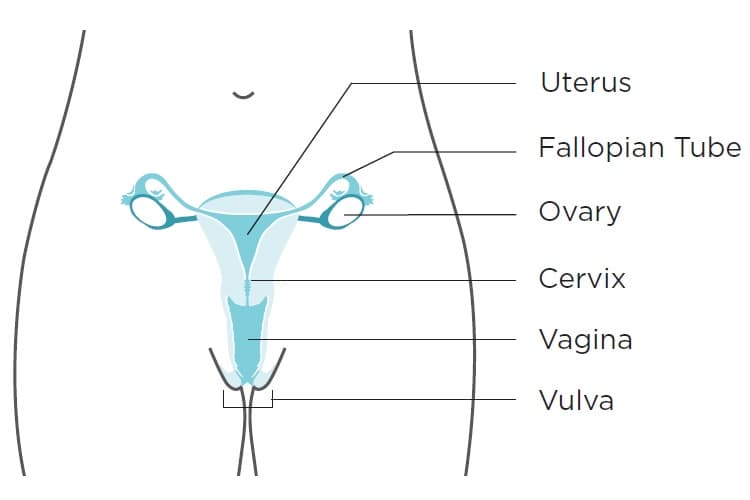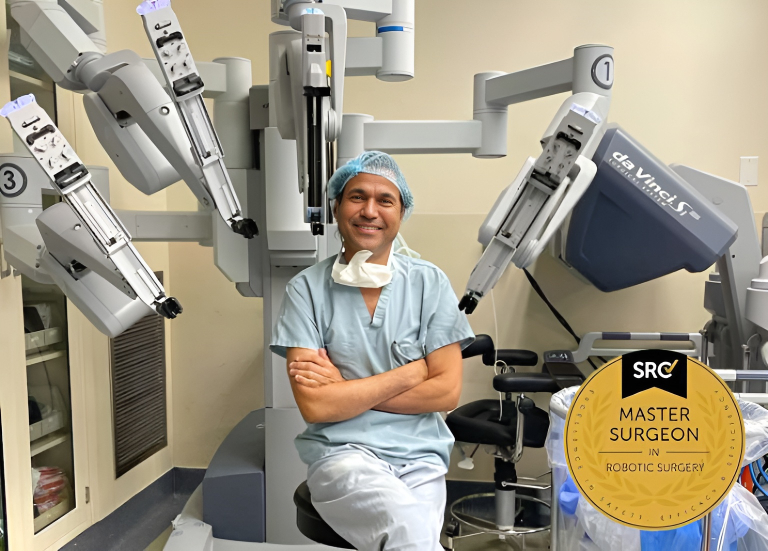Gynecologic Oncology
What is Gynecologic Cancer?
Gynecologic cancer refers to any cancer that originates in a woman’s reproductive system, including the cervix, uterus, ovaries, fallopian tubes, vagina, and vulva. These types of cancer can occur in women of all ages, but the risk increases as a woman gets older.

Types of Gynecologic Cancer
- Cervical cancer: The origin of cervical cancer is the cervix, which is the lower and narrow part of the uterus, also known as the womb.
- Ovarian cancer: The ovaries, located on both sides of the uterus, are where ovarian cancer typically originates. However, some types of ovarian cancers may also develop in the fallopian tubes or peritoneum.
- Uterine cancer: The uterus, a pear-shaped organ located in a woman’s pelvis, is where uterine cancer begins. It is the organ where a fetus grows during pregnancy.
- Vaginal cancer originates in the vagina, which is a hollow, tube-like structure that connects the bottom of the uterus to the outside of a woman’s body.
- Vulvar cancer is a type of cancer that begins in the vulva, which is the external part of a woman’s genital organs. The vulva includes the inner and outer labia, the clitoris, and the vaginal opening. Vulvar cancer can occur in any part of the vulva, but most commonly develops on the labia minora or majora, the two folds of skin surrounding the vaginal opening.
- Fallopian tube cancer is a rare type of gynecologic cancer that originates in the fallopian tubes, which connect the ovaries and the uterus. It is a relatively uncommon form of cancer, accounting for only 1 to 2 percent of all gynecologic cancers. There have been approximately 1,500 to 2,000 reported cases of fallopian tube cancer worldwide. Symptoms of fallopian tube cancer may include abdominal pain, bloating, and vaginal bleeding, but they are often nonspecific and may be mistaken for other conditions.
Gynecologic cancers are distinct from one another, having varied signs and symptoms, diverse risk factors, and distinct preventive measures. Every woman is susceptible to gynecologic cancers, with the likelihood increasing with age. Early detection of gynecologic cancers is crucial for effective treatment.
Symptoms of Gynecologic Cancer
Being mindful of your body and recognizing what is typical for you is essential to identify the symptoms or warning signs of gynecologic cancer, such as cervical, ovarian, uterine, vaginal, and vulvar cancers.
If you experience unusual vaginal bleeding, it is critical to seek medical attention promptly. Any vaginal bleeding after menopause should be reported to your doctor immediately. If you have not yet reached menopause and observe that your periods are heavier, longer than usual, or if you notice abnormal bleeding between periods, talk to your doctor.
If you experience any other warning signs that persist for more than two weeks and are not typical for you, it is important to see a doctor. While symptoms may be attributed to something other than cancer, consulting with a doctor is the only way to confirm the cause.
Signs and symptoms differ among individuals, and each gynecologic cancer manifests with its own distinct set of warning signs and symptoms.
Common Symptoms of Gynecologic Cancers
The symptoms of gynecologic cancers vary depending on the type of cancer, the stage of the cancer, and other individual factors. However, some common symptoms that women with gynecologic cancers may experience include:
- Abnormal vaginal bleeding, such as bleeding between periods or after menopause
- Unusual vaginal discharge that may be bloody, foul-smelling, or discolored
- Pain or discomfort during sexual intercourse
- Pelvic pain or pressure
- Abdominal swelling or bloating
- Changes in bowel or bladder habits
- Fatigue, weakness, or unexplained weight loss
Causes of Gynecologic Cancer
Gynecologic cancers occur when there is a change in the cells lining one of the reproductive organs, leading to abnormal cell growth and multiplication. Despite ongoing research, the exact cause of cancer remains unknown to health experts.
However, certain risk factors have been identified that can increase the likelihood of developing various types of gynecologic cancers.
There are several risk factors that may increase a woman’s likelihood of developing gynecologic cancers. These risk factors include:
- Age: The risk of developing gynecologic cancers increases as women get older, with the majority of cases occurring in women over the age of 50.
- Family history: Women with a family history of gynecologic cancers, particularly ovarian or breast cancer, may have a higher risk of developing these cancers.
- Inherited genetic mutations: Some genetic mutations, such as BRCA1 and BRCA2, increase the risk of developing ovarian and breast cancers.
- Human papillomavirus (HPV) infection: Certain types of HPV can increase the risk of developing cervical cancer.
- Smoking: Smoking has been linked to an increased risk of cervical and vulvar cancers.
- Obesity: Women who are obese have a higher risk of developing endometrial cancer.
- Hormonal factors: Factors such as early menstruation, late menopause, and never having children have been linked to an increased risk of some gynecologic cancers.
- Previous cancer treatment: Women who have undergone radiation therapy to the pelvic area or chemotherapy may have an increased risk of developing certain gynecologic cancers.
It is important to note that having one or more risk factors does not necessarily mean that a woman will develop gynecologic cancer. Many women who develop gynecologic cancers have no known risk factors, and many women with risk factors do not develop these cancers.
Detection of Gynecologic Cancer
Early detection of gynecologic cancer is important for improving outcomes and increasing chances of successful treatment.
Here are some common ways to detect gynecologic cancer:
- Pap smear: A Pap smear is a test that checks for abnormal cells in the cervix, which can be a sign of cervical cancer. Women should begin getting Pap smears at age 21 and continue every 3 years until age 29. After age 30, women can get a Pap smear and HPV test every 5 years.
- HPV test: An HPV test checks for the presence of human papillomavirus (HPV) in the cervix, which can lead to cervical cancer. Women over age 30 may be tested for HPV in combination with a Pap smear.
- Pelvic exam: A pelvic exam is a physical exam that allows a healthcare provider to examine the uterus, ovaries, cervix, and other pelvic organs for signs of cancer or other abnormalities.
- Ultrasound: An ultrasound uses sound waves to create images of the reproductive organs, allowing healthcare providers to look for signs of cancer.
- Biopsy: A biopsy is a procedure in which a small sample of tissue is removed from the reproductive organs and examined for signs of cancer.
- Blood tests: Some gynecologic cancers, such as ovarian cancer, can be detected through blood tests that look for specific tumor markers.
It’s important for women to schedule regular gynecologic exams and discuss any concerns with their healthcare provider.
Stages of Gynecologic Cancer
The stages of gynecologic cancer refer to the extent to which the cancer has spread within the body. The stage of the cancer plays an important role in determining the appropriate treatment plan and predicting the prognosis for the patient.
Most cancer teams use the system developed by the American Joint Committee on Cancer, known as the TNM staging system.
The TNM staging system is a widely used system for staging cancer. It stands for Tumor, Node, and Metastasis, and is based on three key pieces of information about the cancer:
- Tumor (T): This refers to the size and extent of the primary tumor.
- Node (N): This refers to whether or not the cancer has spread to nearby lymph nodes.
- Metastasis (M): This refers to whether or not the cancer has spread to other parts of the body.
Each of these factors is assigned a number, and the combination of numbers determines the stage of the cancer. The stages are typically numbered from 0 to IV, with higher numbers indicating more advanced cancer.
For example, in the TNM staging system for cervical cancer, the stages are as follows:
- Stage 0: Tis, N0, M0 (carcinoma in situ)
- Stage I: T1, N0, M0 (cancer confined to the cervix)
- Stage II: T2, N0, M0 (cancer has spread beyond the cervix, but not to the pelvic wall or lower third of the vagina)
- Stage III: T3-T4, any N, M0 (cancer has spread to the pelvic wall, lower third of the vagina, or causing kidney problems)
- Stage IV: Any T, any N, M1 (cancer has spread to distant organs, such as the bladder or rectum)
The TNM staging system is used for many types of cancer, including gynecologic cancers, and helps doctors plan appropriate treatment and make prognostic predictions.
Treatment of Gynecologic Cancer
It is advisable to request a referral to a gynecologic oncologist if your doctor diagnoses you with gynecologic cancer. These specialists are specifically trained to manage cancers affecting a woman’s reproductive system and will collaborate with you to develop an appropriate treatment strategy.
Types of Treatment
The types of treatment for gynecologic cancer depend on the type and stage of the cancer, as well as the patient’s overall health and preferences. Here are some common types of treatment:
- Surgery: Surgery is often the first line of treatment for gynecologic cancer. It involves removing the cancerous tissue and can range from a simple procedure to remove a small tumor to a more extensive surgery to remove the uterus, ovaries, and other organs.
- Chemotherapy: Chemotherapy is a type of treatment that uses drugs to kill cancer cells. It can be administered intravenously or orally and may be used alone or in combination with other treatments.
- Radiation therapy: Radiation therapy uses high-energy X-rays or other types of radiation to kill cancer cells. It can be given externally or internally, and may be used alone or in combination with other treatments.
- Hormone therapy: Hormone therapy is used to treat some types of gynecologic cancer that are sensitive to hormones, such as some types of breast and ovarian cancer. It involves taking medication that blocks or lowers hormone levels in the body.
- Targeted therapy: Targeted therapy is a type of treatment that targets specific molecules or pathways that are involved in the growth and spread of cancer cells. It may be used in combination with other treatments.
- Palliative care: Palliative care focuses on relieving the symptoms and improving the quality of life for patients with advanced or incurable gynecologic cancer. It may involve pain management, symptom relief, and emotional and spiritual support.
The treatment plan for gynecologic cancer is highly individualized, and patients should discuss their options with their healthcare team to determine the best approach for their particular situation.
NYGS Approach
We understand that a cancer diagnosis can be overwhelming and scary. Here at NYGS, we build our teams around you. Our expert oncologists will help guide you through this difficult time, answering any questions you may have along the way. We are here for you and will do everything in our power to meet your specific needs and exceed your expectations.
If you or a loved one is experiencing symptoms that may be related to cancer, please call us as soon as possible.
Pankaj Singhal, MD, MS, MHCM
- Industry expertise with over 12 years of experience in both academic & private health care settings, physician practice management and executive leadership.
- Trained over 45 gynecologic surgeons along with training fellows in minimally invasive gynecologic surgery and gynecology oncology, and has developed cutting edge, new surgical techniques for endometriosis and laparoscopic surgeries.
- One of the very few surgeons who have completed over 5,718 robot-assisted gynecologic surgeries in the entire United States.
- Known for taking on the most challenging surgery cases that other doctors/centers turn away.

Hear From Our Clients

Joetta Simonette
On May 3, 2018 at Good Samarital Hospital, due to cancer, you performed ovarian surgery on me.
It is now 5 years since that date – 5 years of wellness that has been accomplished through the grace of God guiding your hands and the support of your team and my loving family.
You are an excellent, compassionate and caring doctor who was confident of a good outcome, and so it is!
Thank you, thank you for these past wonderful years. May God continue to bless you. You are in my prayers!

RG Petkos
Power couple Dr. Singhal & Dr. Mclean are amazing!! My experience with them has been absolutely wonderful. I highly recommend either of them for so many reasons mainly for helping me get back some quality of life with my successful full hysterectomy being better than I expected.
The process from the beginning with them was a pleasure and I had quite a challenge beforehand so I’m very grateful that quality, professional, caring doctors still exist!!
I especially appreciate their proactive approach and feel the combination of the care and expertise they provide make for successful outcomes!!

Kimberly Quinde
Dr. Singhal was the doctor who took care of my mother Ivonne Guevara. My mother had gone to 2 other doctors who refused to take care of her fibroid. She was in pain for years and her fibroid had grown really big without her knowing. When my mom went to Dr Singhal she was met with calmness and reassurance that everything will be ok and he would help her get better. Dr. Singhal was so kind and caring all throughout the process.
He took all her worries away and my mom highly recommends him. She hopes every doctor can be as great as Dr. Singhal.
Everyone in his office was so nice to my mom and it was a great experience given the circumstances.
Hospital Affiliations



Request an Appointment
"*" indicates required fields






